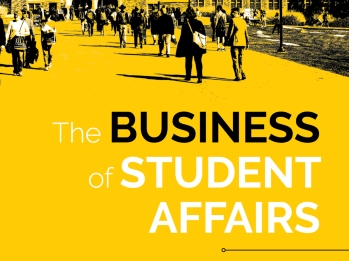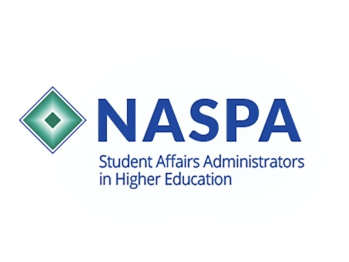
The Business of Student Affairs
Virtual Short Courses Career and Workforce Development Supporting the Profession AVP or "Number Two" Mid-Level Senior Level VP for Student Affairs
July 11 - August 5, 2022 Virtual Short Course
Based on the new NASPA publication of the same title, this short course is a primer on the fundamental business-related aspects of student affairs that all practitioners need to know. Topics include financing and budgeting; organizational design; human resources; facilities management; technology; auxiliary operations; legal issues and risk management; crisis management; strategic planning; and communications.
Registration includes access to all course content, as well as the full e-book, The Business of Student Affairs: Fundamental Skills for Student Affairs Professionals. Course registrants will also benefit from four opportunities to engage with the instructor and each other in live sessions. The final live session will include an interactive panel with college and university presidents!
Presented By

Course Sessions
Week 1: Planning and Money
July 11-17, 2022
Video Modules and Readings:
- Student Affairs Financing and Budgeting
- Strategic Planning, Assessment, and a Culture of Evidence
Learning Components:
The strategic planning process
- Conducting a self-study - SWOT analysis
- Engaging outside reviewers
- Participatory planning and reactions
Assessment opportunities and challenges
- Sources and uses of data
Adopting and marketing a strategic plan
- Internal and external audiences
Sources of funds for Student Affairs operations
- Institutional allocation
- Fees
- Gifts and investment income
- Business operations
- Internal recharges
Uses of funds
- Annual expenditures
- Capital expenditures
- Reserves
Budget Development
- Multi-year projections
Alignment with strategic planning processes
Week 2: People and Places
July 18-24, 2022
Video Modules and Readings:
- Organizational Design and Models
- Human Resources
- Real Estate and Facilities Management
Learning Components:
Management and supervisory skills
- Assessment of performance
- Rewards and recognition
- Value of professional development
- Managing up and down
Organizational and leadership skills
- Conceiving of organizational models
- Leadership frameworks, hierarchies and pitfalls
- Politics and navigational skills
Campus as environment and infrastructure
- Long-term facility planning: Understanding the strengths and weaknesses of a campus environment
- Facilities development and financing models
- Public vs private models
Week 3: Partners and Support
July 25-31, 2022
VIdeo Modules and Readings:
- Technology
- Auxiliary and Other Operations
- Legal Issues and Risk Management
Learning Components:
Variety and scope of technological applications for student affairs
- Enterprise applications
- Departmental specific uses of technology
- Technological competencies for student affairs practitioners
- Future implications for AI and other emerging innovations
Understanding the scope of related operations that serve students (and others)
- Housing and dining; Event management, Arts management; Public safety and police; etc.
- Revenue generation options and consequences; Tax implications
Risk mitigation strategies and obligations
Why and how to work with General Counsel and other lawyers
- Public and private distinctions and responsibilities
- Pertinent legal environments essential to know
Week 4: The Expected, Unexpected, and Future Considerations
August 1-5, 2022
Video Modules and Readings:
- Crisis Response and Management
- Communications
- Student Affairs-An Uncertain Future
Learning Components:
Anticipating the worst and reacting to worse than expected
- Crisis preparation planning and training exercises
- Information dissemination, management and inevitable loss of control
Student affairs communications planning
- Internal and external, to various stakeholders; in calm and in crisis; public vs. confidential informational; anticipatory and reactionary.
- Communications tools and techniques
- Working with campus and public media
- Social media as bane and benefit
Scenario planning for uncertain futures of student affairs and higher education
Schedule
- Wednesday, July 13, 3:00 p.m. – 4:30 p.m. ET
- Wednesday, July 20, 3:00 p.m. – 4:30 p.m. ET
- Wednesday, July 27, 3:00 p.m. – 4:30 p.m. ET
- Wednesday August 3, 3:00 p.m. – 5:00 p.m. ET (Note: This last live session is two hours in length given the panel of presidents.)
Instructor and Guest Speakers
This unique course is designed and instructed by Dr. Larry Moneta--author of The Business of Student Affairs: Fundamental Skills for Student Affairs Professionals. Dr. Moneta is joined by numerous higher education and student affairs executives and professionals within the following course video modules:
- Tammara Durham, Vice Provost for Student Affairs, The University of Kansas (Session: Student Affairs Financing and Budgeting)
- Dan Harder, Vice Chancellor for IT and CIO, The University of Tennessee Health Science Center (Session: Technology)
- Tom Hier, Founder, Biddison-Hier (Session: Real Estate and Facilities Management)
- Erin Hoffmann Harding, Management Consultant, McKinsey & Co. (Session: Legal Issues and Risk Management)
- Blanche Hughes, Vice President for Student Affairs, Colorado State University (Session: Auxiliary and Other Operations)
- Ryan Lombardi, Vice President for Student & Campus Life, Cornell University (Session: Organizational Design and Models)
- Caroline Nisbet, Associate Vice President for Student Affairs, Duke University, Retired (Session: Human Resources)
- Julie Payne-Kirchmeier, Vice President of Student Affairs, Northwestern University (Session: Student Affairs-An Uncertain Future)
- Baishakhi Taylor, Dean of the College and Vice President for Campus Life, Smith College (Session: Communications)
- Michele Toppe, Vice Provost for Student Affairs, Portland State University (Session: Crisis Response and Management)
- Victor Wilson, Vice President for Student Affairs, University of Georgia (Session: Strategic Planning, Assessment, and a Culture of Evidence)
The closing live session panel of presidents is currently being updated. Details will be shared on the course webpage at a later date.
Instructor
Registration
NASPA individual members and Voting Delegates have access to member pricing for all NASPA events. If you are not a NASPA individual member, please visit our membership section to learn more about membership types and benefits. In many cases, an annual NASPA membership plus the event member registration fee are still less than the event non-member registration fee. We hope you’ll consider joining today!
Registration for this course includes access to all short course content and a downloadable copy of The Business of Student Affairs: Fundamental Skills for Student Affairs Professionals e-book. The e-book will be available as part of the course in NASPA's online learning community.
|
Registration Fees
|
Policies and Contact Information
Contact Information
Registration Issues/Questions:NASPA Main Office | (202) 265-7500
|
Program Questions/General Information:NASPA Online Professional Development
opd@naspa.org | (202) 903-0654
|
Payment Policies
To view NASPA's complete payment policies and procedures, click here.
Captioning Requests
Text Captioning Support: NASPA kindly requests that text captioning requests for course videos and live sessions be shared no later than June 17, 2022 at 11:59 pm (ET). Captioning can be requested within online registration.
